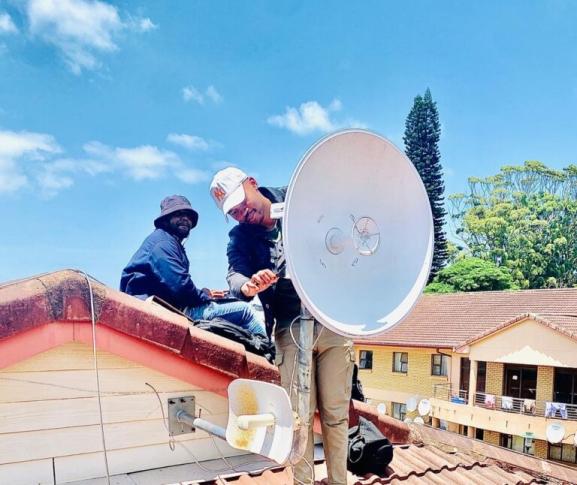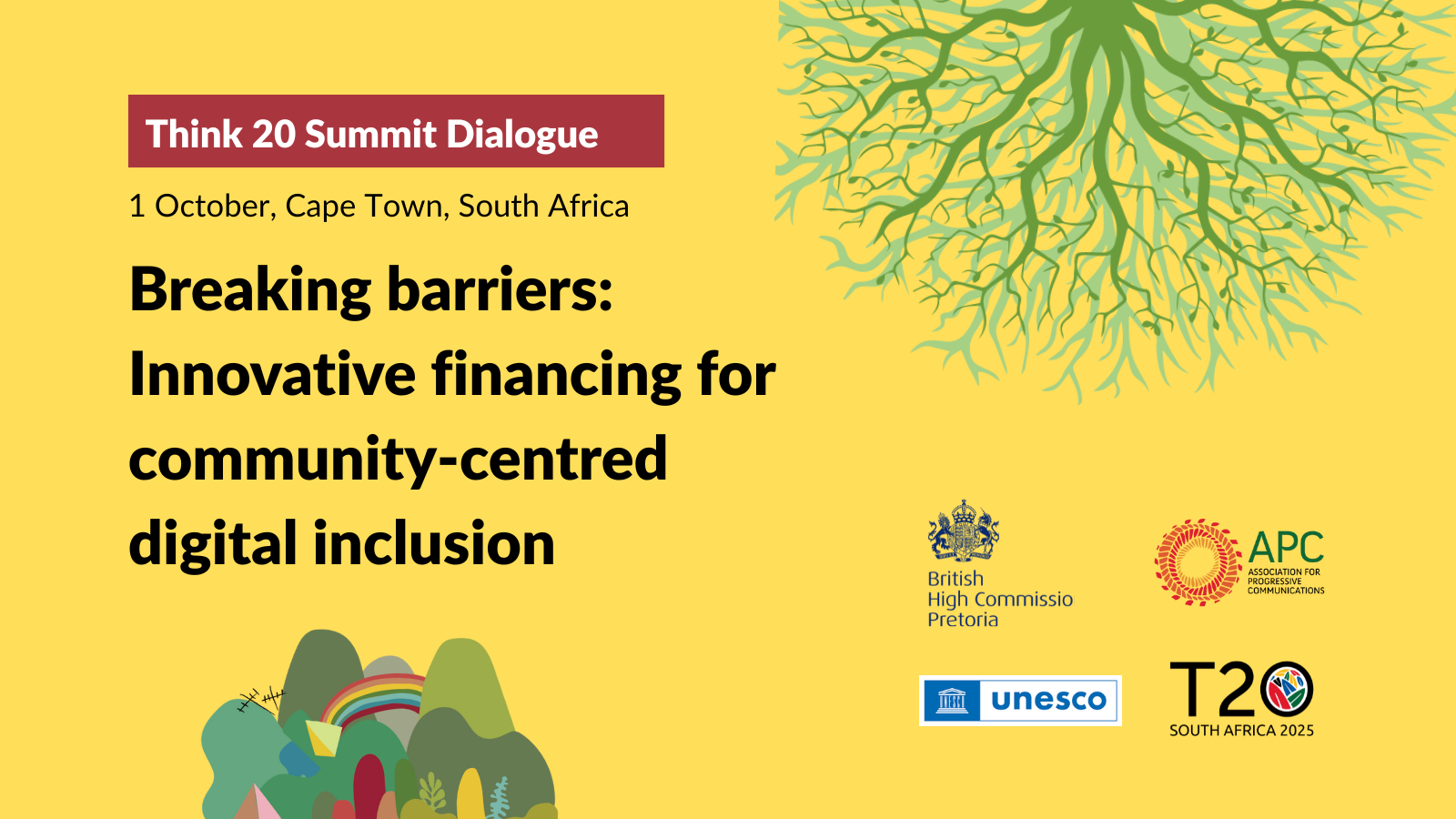
Nearly one-third of humanity has never used the internet, and these figures worsen in rural and marginalised urban areas, particularly in the Global South. For groups facing systemic barriers, such as women, Indigenous peoples, or low-income communities, the problem is even more severe.
In response, a growing movement is amplifying the voices of those who remain disconnected -- or connected under conditions that fail to ensure meaningful, affordable and appropriate access. This movement is speaking out to say that while there are enough resources to bridge many digital divides, a limited mindset in terms of policy, regulation, and financing is preventing community-centred models from thriving.
The upcoming Think 20 Summit Dialogue, convened by the UK’s Foreign, Commonwealth & Development Office, the Association for Progressive Communications and UNESCO, will focus on breaking down the barriers that hinder community-centred connectivity and access to innovative financing for digital inclusion.
Unpacking contexts and challenges
On 1 October 2025, the T20 Summit Dialogue will be held as a side event of the G20 under South Africa’s presidency, proposing a conversion on “Breaking barriers: Innovative financing for community-centred digital inclusion”. This side event will gather representatives of important institutions and organisations committed to digital inclusion locally, regionally and globally. It will offer a key opportunity to focus on growing concerns about the funding and financing of community connectivity in the wider scope of its sustainability.

The T20 is a network of researchers and experts that supports the G20 on issues like climate change, economic inequality and sustainable development. The current G20 South Africa presidencies is the last of a sequence of four Global South presidential periods, preceded by Indonesia, India and Brasil. South Africa’s T20 theme is: "Consolidate and Sustain”, strategically aligned with the commitment to strengthening community-centred connectivity initiatives (CCCIs), which have proved capable of bridging the digital divide, if barriers that impede them can be overcome.
The T20 Dialogue Summit will be held in Cape Town in onsite and online sets. It will be structured in two sessions, one devoted to the rationale, context and experience of CCCIs, and the other reflecting on what is promoting or impeding their growth. Each of the sessions will be unpacked by two panels.
In the first session, the first panel will look at context, focusing on analysing the access gaps and looking at models for providing meaningful connectivity, for later learning. In the second panel, representatives from existing initiatives will share more on their business models, the products and services they offer, and the definitions and strategies they have adopted to be sustainable. The second session will reflect on the growth of CCCIs with a panel focused on the challenges of implementing enabling policies and regulations. The final panel will address financing alternatives, moving “from public finance to investment and community partnerships to philanthropy”. The voices of researchers, experts and active participants in developing experiences will share perspectives and move on to answer this central question: What is needed to ensure dynamic, creative, diverse and responsive financing solutions?
This will be a unique opportunity to hear directly from those building this area, such as the hosting institutions and other local organisations, for example the Department of Communications and Digital Technologies of South Africa and the Development Bank of South Africa, and Vnet, Project Isizwe, Ellipsis Regulatory Solutions, ICASA, and Ad Notes also from the local arena. With a regional focus, Research ICT Africa and the African Climate Foundation will be in attendance and Anatel and CETIC.br from Brazil will share their regulatory experiences. Other participants will include B4RN, from the United Kingdom, Common Room, from Indonesia and Zenzeleni, also from South Africa, three success stories that will share their strategies and challenges encountered while funding their initiatives. Meet all the participants here.
Coming together to share a growing concern
In parallel to the T20 summit dialogue, a social media campaign is being launched to raise awareness around the impact of CCCIs and the barriers they face. Through key messages, testimonies, quotes, and sharing resources that have been leading the conversation, the campaign seeks to highlight community voices -- amplifying the perspectives and needs of those building alternative connectivity models and drawing attention to the urgency of diversifying financial mechanisms.
You can follow the campaign on Facebook, Linkedin, Mastodon or Bluesky. Join the conversation on #SustainableConnectivity, #InnovativeFinancing and #CommunityNetworks, and invite others to join in and spread the word.
Community connectivity initiatives have gained visibility as sustainable, inclusive and effective approaches to closing access gaps, while promoting social and economic benefits. For many unserved regions, they are not just an option but the only path toward equal, rights-based digital inclusion.
As reflected in the Principles and the Typologies of CCCIs, these initiatives share common attributes that bring them together, while also presenting a variety of approaches in the way they function and find sustainability and funding. “These models treat users as partners rather than just customers, leveraging local knowledge and trust to create sustainable networks. Their potential is increasingly recognised, from T20 policy recommendations to ITU resolutions and the outcomes of the UN Financing for Development Conference” affirms the convening document to the T20 side event. However, significant barriers still impede their upscaling and sustainability.
The main barriers consistently identified as limiting the growth of CCCIs are the absence of policies that extend connectivity to the unconnected, the absence of regulations that recognise and enable alternative models tailored for communities, and the lack of financing mechanisms that make it possible to take the steps required to meet their local needs. Moreover, facilitation and innovation in funding for communities is increasingly urgent, becoming critical in the current context of declining traditional funding sources. “Faced with an increasingly fragmented funding ecosystem, civil society needs to rethink their positioning, align their resource mobilisation strategies and find avenues for collective action and advocacy”, as explored in this article.
Several voices note that this is a strategic moment, as key milestones are being achieved by committed local, regional and global organisations working to amplify rights and expand community development. Global spaces such as this year’s IGF or the recent WSIS+20 summit also provided important opportunities to further explore the issue and amplify the conversation. The panel on financing developed during the IGF involving the launch of the DC3 book is one such milestone.
More recently, a task force on digital financing was proposed to be a concrete outcome of the WSIS+20 process. “Despite years of discussion, financing for digital equity and inclusion remains fragmented, under-resourced and poorly coordinated” said Konstantinos Komaitis, Valeria Betancourt and Anriette Esterhuyse, referring to the launch. “This calls for a holistic financing approach that prioritises infrastructure deployment but is not limited to it. It must also fund digital literacy programmes, inclusive policy making, local innovation ecosystems and the capacities of governments and communities to design and implement digital strategies that serve their own needs.”
Moving from only relying on international aid towards innovative funding mechanisms, CCCIs are in search of alternative approaches. Blended finance and other innovative financial mechanisms as well as experiences from the social and solidarity economic initiatives in other sectors are being addressed, opening new areas of reflection and solutions for the sustainability of CCCIs.
The T20 Summit Dialogue side event offers a great opportunity to deepen this reflection and plan the way forward. The concept note, the detailed agenda and speakers can be seen here. The link to the registration form is here.